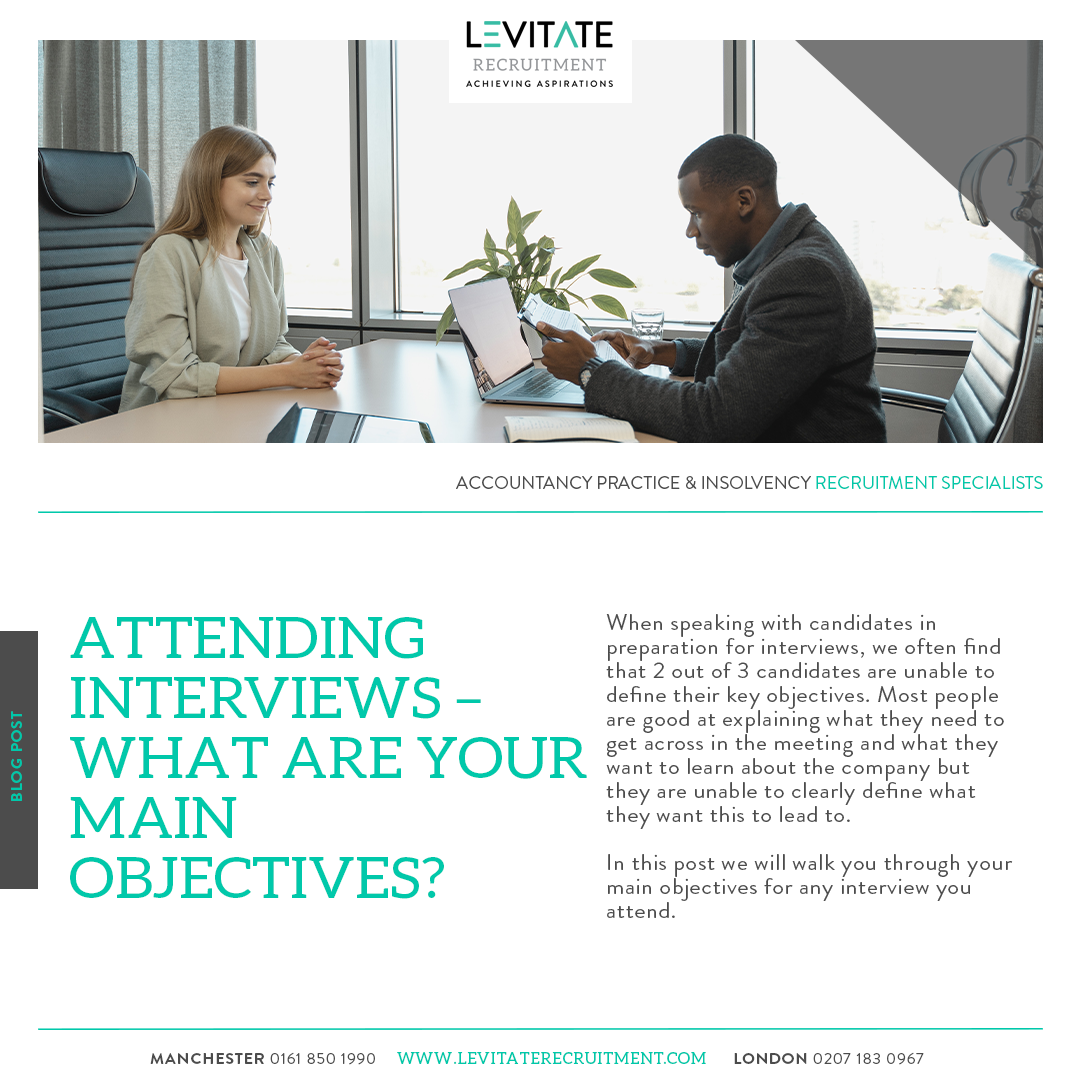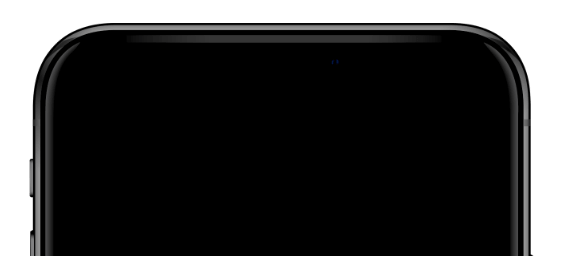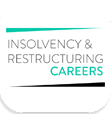Within this post, we will talk about our experience of working with candidates before interviews and how important it is to define your goals and objectives when meeting with a potential employer.
Moving jobs can be a stressful time for most people as they are heading into the unknown. You will be stepping away from your comfort zone of walking into your current office where you are respected by colleagues (hopefully) and you know your job and what is expected of you. Suddenly you are putting your name out there and are now in a position where you will need to sell your skills, experience and personality to someone you have never met. Often this uncomfortable feeling will lead to nerves and it can often change the mindset of how someone approaches their search and how well they perform at an interview.
When speaking with candidates in preparation for interviews, we often find that 2 out of 3 candidates are unable to define their key objectives. Most people are good at explaining what they need to get across in the meeting and what they want to learn about the company but they are unable to clearly define what they want this to lead to.
The main answers we receive when asking ‘What do you feel are the 2 key objectives for you when attending an interview?” are as follows:
Category 1
- To sell my skills & experience
- To show them I am the right person for the role
- To get my personality across
- To demonstrate to them that I work well in a team and with clients
- To get on well with the interviewer
Category 2
- To find out more about the role and the client base.
- To see if I would be more suited to working in a smaller/larger work environment/firm
- To make sure the location of the office or clients work for me
- To see if they are a better firm to work for than my firm
- To see if the opportunity is better than another one I have been offered – It will give me a good comparison
- I have heard mixed reviews about the firm from people that have previously worked there but I would like to decide for myself
There are many more (some too ridiculous to mention), but the above are the main ones. As you will see, the responses have been split into 2 categories; the first is about impressing the interviewer and the second set are aligned to finding out more information on the company.
We often hear: “The interview is a two-way process. The company need to sell themselves to me so that I want to work for them”
It’s hard to disagree with this and we always speak with our clients before an interview and recommend that they do sell the opportunity as we are working in what many would class as a ‘candidate led market’ where there are often more opportunities being advertised than readily available candidates that are looking to make a move. In this case, candidates have more than one option to consider so clients should be selling the opportunity, whilst also trying to gain an understanding of the person’s skills and experience and suitability for the role.
From a candidate perspective, the client selling the role to you is important and it’s great for you to feel the love but it is also a Two-way process for the client so it is more important that you identify and align your objectives in the correct order to ensure you get the best out of the interview.
Main Objectives:
Objective Number 1 – GET THE JOB!
Objective Number 2 – Decide if you want it! – Gather enough information about the opportunity to decide if it is for you.
Obvious, right? In plain sight, it is but it’s very rare that people come to this conclusion straight away and will often order them in the wrong way. We sometimes hear, “what’s the point in being offered a role I don’t particularly want” This is a fair point but unfortunately, it is very difficult to come to this decision until you have met with the firm and it can, unfortunately, lead to an unsuccessful and disappointing outcome.
Prioritising them in the right order will hopefully leave you in a position of control. If you lose this control, then ultimately you could lose it as an option. It is much better to be in control and have more than one offer of employment on the table. Once a firm has made the decision that you will add value to their business and they want to employ you, we now have more leverage to go back and ask further questions to assist you in determining, is this role right for me!
Candidates should also consider how much time they spend in an interview asking questions. This could be your only chance to sell yourself to the firm and they may have other candidates under consideration. There is nothing worse than not being offered a role purely because you were unable to tell them about something they needed to know to make a positive decision. Asking good quality questions about the role, the firm and the overall opportunity is a key part of the interview but most of your time should focus on providing reasons as to why you are the best candidate for the position, rather than, are you the best company for me. You will have the option to ask any further questions at the end of the meeting and again, greater leverage to ask further questions once an employer has offered you a position and want you to join the team.
Preconceived ideas and order of preference
It is also very natural for people to have preconceived ideas about firms and often candidates will start to rank opportunities in order of preference before they have even met with a firm. Reasons behind this can be any of the following:
- Size of the firm and where they rank compared to others in the Top 100
- Location of the business
- The number of offices they have
- Opportunity to work overseas -Do they have an international presence
- Company brand and how they represent themselves online
- Other people opinions of the firm and what they have heard
- The job specification
- What other service lines do they have
- The interview process – Do they have testing and how many interviews will there be
It is very difficult to move away from preconceived ideas and preferences as we are all human and whilst they can sometimes be positive, the problem of holding preconceived notions as being true is that they can also lead us to very negative and critical beliefs that can also affect behaviours and how well you perform in an interview.
This is something that we discuss with every candidate we work with and it’s amazing how many times people will change their mind about a firm and where it sits in their order of preference once they have met with them.
Put yourself in the position of this happening to you. You have met with a firm that has shown interest in you joining and you have now decided that you really want to work for them, this is the job you have been dreaming about – If you knew this before the interview, what order would your objectives have been in? Are you now worried that you won’t be offered the job? Have you done enough to be offered the job?
By clearly defining your objectives and putting them in the right order, you should have prepared extremely well for this interview and done everything you can to achieve an offer. If an offer comes then you have hopefully reached both of your objectives successfully – WELL DONE TO YOU. If an offer doesn’t come, you have only successfully met one objective of deciding that the firm is right for you but unfortunately, you have not done enough to be offered the dream role and Objective Number 2 now becomes irrelevant!
It is so important that you do your best to remain in control so again your focus and Number 1 objective of going to an interview should always be:
GET THE JOB and then decide afterwards if you want it!
For advice about your career options, speak to Scott Lowes at Levitate Recruitment, specialists in placing practice-trained accountants and insolvency professionals across the UK, and find the right role to suit your ambitions.







